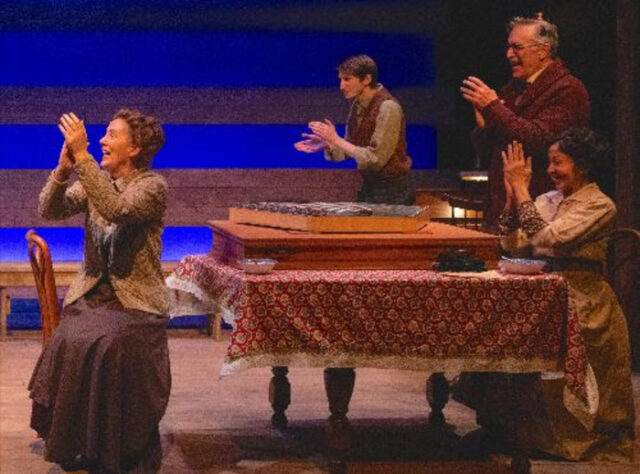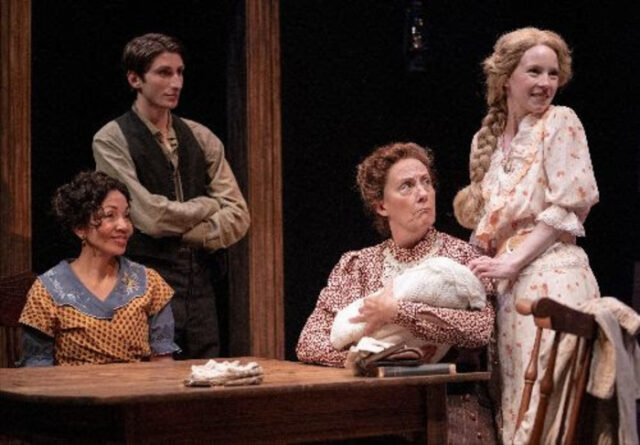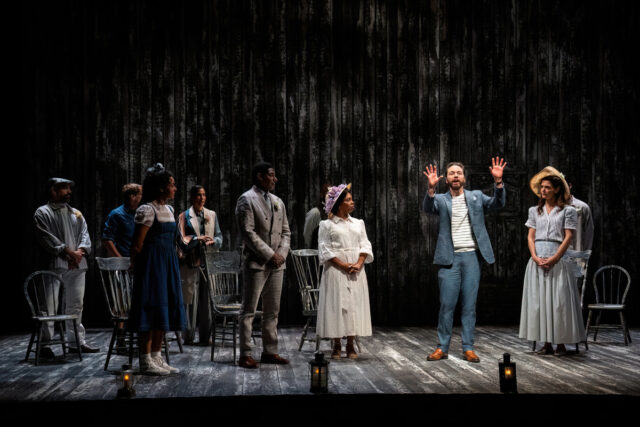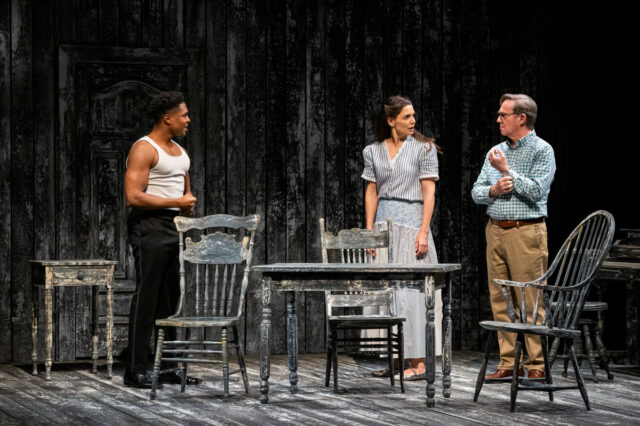
The Mint produciton of Lynn Riggs’s Sump’n Like Wings is worthy of much applause (photo by Maria Baranova)
SUMP’N LIKE WINGS
The Mint Theater at Theatre Row
410 West 42nd St. between Ninth & Tenth Aves.
Tuesday – Sunday through November 2, $39-$99
minttheater.org
www.theatrerow.org
In 1938, Thornton Wilder, who was born in Wisconsin in 1897, wrote what many consider one of the greatest American plays, the Pulitzer Prize–winning Our Town. The drama, a perennial favorite in high schools and community theater and off and on Broadway, is set in the small, fictional town of Grover’s Corners, New Hampshire, in 1901, where ordinary people go about their ordinary lives, including going to church, falling in love, and facing tragedy. It can currently be seen in an all-star version at the Ethel Barrymore through January 19. Wilder, who was gay, also won Pulitzers for his 1927 novel, The Bridge of San Luis Rey, and his 1942 play, The Skin of Our Teeth.
In 1925, Lynn Riggs, who was born in Oklahoma in 1899, wrote Sump’n Like Wings, a little-known play that was published in 1928 and premiered in 1931. The rarely performed drama is set in the small, fictional town of Claremont, Oklahoma, where ordinary people go about their ordinary lives, including going to church, falling in love, and facing tragedy. It concluded its too-short run at Theatre Row on November 2. Riggs, who was gay, also wrote the 1931 play Green Grow the Lilacs, which was the basis for the classic musical Oklahoma!, which won a Pulitzer in 1944 in addition to several Tonys and Oscars over the years.
The New York premiere of Sump’n Like Wings is presented by the Mint, the theater world’s finest purveyor of lost, forgotten plays, but this one is a welcome change of pace for the company, which specializes in British and American working-class tales and drawing-room comedies that often explore sociopolitical issues of their time. The splendid two-hour, two-act play takes place in the Old West of the 1910s, where the characters speak in western drawl and rhythm unusual for the Mint but as exquisitely rendered as ever.
The strict Mrs. Baker (Julia Brothers), a widow, operates the dining room of the St. Francis Hotel for Ladies and Gents in Claremont, where she is raising her sixteen-year-old daughter, the wild child Willie (Mariah Lee), with the help of her brother, Jim Thompson (Richard Lear), who owns the hotel. The town is aghast when shoplifter Elvie Rapp (Lindsey Steinert) lets all the prisoners out of the local jail; to rehabilitate her, Sheriff Beach (Andrew Gombas) is forcing her to work for Mrs. Baker. Instead of going to school, Willie waits tables for her mother, but she is being pursued by the married Boy Huntington (Lukey Klein), who wants to run away with her. Judging them all is Jim’s housekeeper, Hattie (Joy Avigail Sudduth).
Talking about why she let the men go, Elvie tells Willie, “You don’t know whut it is to be locked up, locked up away from the sun and the air. You don’t know whut it means not to be free to go and come whenever you please — with no one to stop you, and no iron bars a-shuttin you in like a animal —.” Willie cuts her off, declaring, “I — do — too.” Elvis responds, “You don’t! You cain’t know! And you don’t know how fin’lly you git sick, sick inside of yer head, so you’d do anything — anything at all to git free, to git away. It ain’t that you wanta go anywheres. It’s the idy of the bars that makes you mad. The bars git in yer mind, and you’d do anything to break em down, to git rid of em —.”

Lynn Riggs’s Sump’n Like Wings explores life in a small Oklahoma town in the 1910s (photo by Maria Baranova)
Therein lies the theme of the play; nearly every character is trying to escape something, searching for freedom from the bars that have surrounded them. They hop railroad cars, go to church, fight over a game of checkers, fall in and out of love, bury themselves in the newspaper, or break the law, challenging societal norms or getting swept up in them. In the first scene, Mr. Clovis (Buzz Roddy), Mrs. Clovis (Traci Hovel), and Osment (Mike Masters) are eating in the dining room and gossiping about Elvie. While the Clovises see the former prisoners as “crimernals, ever one of em!,” cowman Osment insists, “They was men, Mis’ Clovis. They was men.”
They then hear fierce noises coming from behind a closed door; it’s Willie, screaming to be let out, threatening to kick the door down. Mrs. Baker yells right back at her, threatening her. It ultimately turns out that the door is not locked, that Willie could have opened it at any time by herself. But not everyone in Claremont — or anywhere, in the past, present, or future — knows that.
The Mint is justifiably renowned for its fashionably detailed sets, but Junghyun Georgia Lee keeps it relatively simple this time, employing a handful of unadorned wooden chairs and tables that are moved around as the scene shifts from the dining room to a hotel office to a rooming house, with a closed door at one end and an open one at the other. In the back are rows of horizontal slats with enough space between them that the outside world is temptingly visible, filled with both hope and fear. Emilee McVey-Lee’s period costumes maintain the mostly brown color palette. As always with the Mint, the cast is impeccable, transporting the audience to 1910s Oklahoma. Raelle Myrick-Hodges’s (Dirty White Teslas Make Me Sad, Flyin’ West) intricate direction adds contemporary relevancy to the play nearly a century after it was written; who isn’t seeking some form of escape from something these days?
Riggs, who was part Cherokee and served in the US military, died in New York City in 1954 at the age of fifty-four, leaving behind twenty-one full-length plays, about a dozen screenplays (The Plainsman, Sherlock Holmes and the Voice of Terror), and numerous short stories. He was inducted into the Oklahoma Hall of Fame in 1943 and deserves to be better remembered for more than just one play.

Jim Parsons stars as the Stage Manager in Broadway revival of Our Town (photo by Daniel Rader)
OUR TOWN
Ethel Barrymore Theatre
243 West Forty-Seventh St. between Broadway & Eighth Ave.
Through January 19, $74 – $321
www.ourtownbroadway.com
Two-time Tony winner Kenny Leon’s streamlined adaptation of Thornton Wilder’s Our Town suffers from trying too hard to be all things to all people. Like Sump’n Like Wings, it has a spare, rustic set, with various chairs and tables being moved around and a large distressed wood barn wall in the back, with one door and a pair of windows that open up like the Laugh-In joke wall. Fifteen audience members sit in boxes on either side of the stage, more like a jury than part of the neighborhood being celebrated between them. Meanwhile, rows of lanternlike lights extend like stars over the stage and the audience, as if we’re part of this neighborhood too. (The set is by Beowulf Boritt, with costumes by Dede Ayite, lighting by Allen Lee Hughes, and sound by Justin Ellington.)
The first words we hear are “Shema Yisrael,” which begins the Jewish prayer of affirmation, here from the 2019 Abraham Jam song “Braided Prayer,” which features sacred words from multiple religions; the cover of the album features three silhouetted figures in three doorways, holding different phases of the moon, surrounded by religious-tinged quotes in English, Hebrew, Arabic, and other languages. The Stage Manager, played with frantic charm by Jim Parsons as if he’s trying to end services early — Parsons previously played the Supreme Being in 2015’s An Act of G-d at Studio 54 on Broadway — points out, “Religiously, we’re eighty-five per cent Protestants; twelve per cent Catholics; rest, indifferent.” Thus, there appear to be no Jews (or Muslims) in 1901 Grover’s Corners, New Hampshire, although, near the end of the play, a Jewish star is visible on a gravestone in the cemetery.
In addition, the diverse casting is strongly evident, as if making its own case, including deaf milkman Howie Newsome (John McGinty), who communicates with his customers in sign language. And to insist on the play’s relevance in the twenty-first century — the time and setting in noted as “now” — two characters pull out cell phones, only to be chastised by the Stage Manager. It’s less cute than it is annoyingly disconcerting. And when a belligerent woman, portrayed by Bryonha Marie, who is Black, asks, “Is there no one in town aware of social injustice and industrial inequality?,” it takes on a different meaning today than it would have when performed by a white actor seventy-five years ago. (The question might sound like it’s been added for this production, but it’s in the original script, again revealing Wilder’s talent for the universal.)

George Gibbs (Ephraim Sykes) chats with Mr. and Mrs. Webb (Katie Holmes and Richard Thomas) in Kenny Leon’s Our Town (photo by Daniel Rader)
Wilder populates his imaginary world with mostly respectably people doing mostly respectable things. “Nice town, y’know what I mean?” the Stage Manager says. “Nobody very remarkable ever come out of it, s’far as we know.”
Dr. Gibbs (Billy Eugene Jones), the town MD, chats with the paper deliverer, Joe Junior, while Mrs. Gibbs (Michelle Wilson) tends to her garden and their son, George (Ephraim Sykes), dreams of being a baseball player and is falling for his next-door neighbor, Emily Webb (Zoey Deutch), who lives with her brother, Wallee (Hagan Oliveras), and their parents, Mrs. Webb (Katie Holmes), who also has a garden, and the knowledgeable Mr. Webb (a standout Richard Thomas, yet again), editor of the Grover’s Corners Sentinel. Shorty Hawkins flags the 5:45 train to Boston. The town drunk, Simon Stimson (Donald Webber Jr.), conducts the church choir. State university professor Willard (Shyla Lefner) encapsulates the town’s history.
Constable Warren (Bill Timoney) walks the beat, engaging in small talk with the citizenry. Mrs. Soames (Julie Halston) raves on and on about a wedding. Undertaker Joe Stoddard (Anthony Michael Lopez) hates to supervise when they’re burying a young person.
In Grover’s Corners, people live and people die. There are no spoiler alerts when the Stage Manager tells us what is going to become of some of the characters. Leon has eliminated the two intermissions; the three acts — “Daily Life,” “Love and Marriage,” and “Death and Eternity” — are identified by the Stage Manager, who hustles things along, getting the audience out in a mere hundred minutes. This Our Town is a pleasant experience; there are plenty of untidy edges and few lofty moments. But it doesn’t quite feel like real life either; the manipulation is evident, including at the end, where tears flow.
Wilder, who was Protestant and served in the military, died in Hamden, Connecticut, in 1975 at the age of seventy-eight, leaving behind dozens of full-length and short plays, seven novels, and one screenplay (Shadow of a Doubt), but he will forever be remembered first for Our Town.
[Mark Rifkin is a Brooklyn-born, Manhattan-based writer and editor; you can follow him on Substack here.]